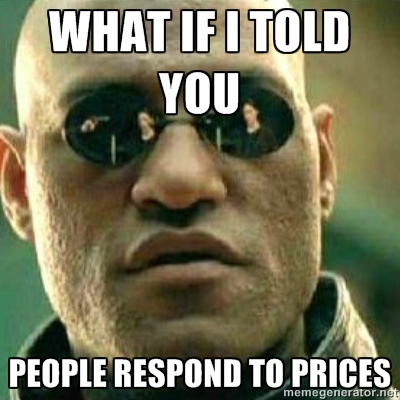Last updated on December 2, 2012
Overfishing is becoming increasingly recognized for the ecological disaster that it is. The capacity of the global aggregate fishing fleet is at least double of what is needed to exploit the oceans sustainably, and fishing methods such as industrial bottom trawling have proved particularly destructive. Add to this the rise in atmospheric carbon dioxide, leading to increased sea temperatures and ocean acidification, oil spills, agricultural and industrial run-off, pollution from aquaculture, and the enormous accumulation of plastic debris in water, and the critical situation for marine wildlife becomes clear.
That’s UN special rapporteur on the right to food Olivier De Schutter writing in — where else? —The Guardian last week.
Not once in his op-ed does De Schutter even remotely consider the idea that we already have a good mechanism in place to regulate overfishing and the depletion of the world’s stock of fish.
What is that Magical Mystery Mechanism? Prepare to be underwhelmed:
It’s the price of fish.
Indeed, my coauthors and I recently published an article in PLoS ONE discussing the role of fish prices — in particular, the role of the FAO’s fish price index, which my coauthors developed — in putting in place the right incentives for consumers and producers of fish.

Let me put it real simple like: With overfishing, as fish gets really scarce and is in danger of going extinct, the price of fish increases. This means that consumers will substitute away from fish, toward other sources of protein.
Also, it looks as though those who love to romanticize smallholder farming have just discovered fish. De Schutter continues:
In parallel to industrial trawlers and distance fleets, some 12 million small-scale fishers operate in coastal and inland marine areas across the world, deriving vital income and dietary protein from fisheries in a way that contributes crucially to the food security of whole communities. Data shows that small-scale fishers actually catch more fish per gallon of fuel than industrial fleets, and discard less fish.
Really? If that is so, why aren’t those smallholders supplying to the market? I mean, if they are so efficient, they can undercut the big boys on price and make a killing by capturing all of the demand, right?
Right?
Beyond the sarcasm, I share with De Schutter the belief that every human being has the right to food. But to completely ignore the realities of what drives human behavior (i.e., incentives) and to romanticize the role of smallholders in the grand scheme of things is to cause a disservice to food security.
I see the right to food as unalienable. But the right to keep eating the same diet throughout one’s life? No. First off, we should aim for better nutrition among many of those smallholder populations. Second — and this isn’t to deny the role of culture — but diets should rationally adapt to reflect economic circumstances.
Would It Kill Olivier De Schutter to Consider Incentives?
Last updated on December 2, 2012
Overfishing is becoming increasingly recognized for the ecological disaster that it is. The capacity of the global aggregate fishing fleet is at least double of what is needed to exploit the oceans sustainably, and fishing methods such as industrial bottom trawling have proved particularly destructive. Add to this the rise in atmospheric carbon dioxide, leading to increased sea temperatures and ocean acidification, oil spills, agricultural and industrial run-off, pollution from aquaculture, and the enormous accumulation of plastic debris in water, and the critical situation for marine wildlife becomes clear.
That’s UN special rapporteur on the right to food Olivier De Schutter writing in — where else? —The Guardian last week.
Not once in his op-ed does De Schutter even remotely consider the idea that we already have a good mechanism in place to regulate overfishing and the depletion of the world’s stock of fish.
What is that Magical Mystery Mechanism? Prepare to be underwhelmed:
It’s the price of fish.
Indeed, my coauthors and I recently published an article in PLoS ONE discussing the role of fish prices — in particular, the role of the FAO’s fish price index, which my coauthors developed — in putting in place the right incentives for consumers and producers of fish.
Let me put it real simple like: With overfishing, as fish gets really scarce and is in danger of going extinct, the price of fish increases. This means that consumers will substitute away from fish, toward other sources of protein.
Also, it looks as though those who love to romanticize smallholder farming have just discovered fish. De Schutter continues:
In parallel to industrial trawlers and distance fleets, some 12 million small-scale fishers operate in coastal and inland marine areas across the world, deriving vital income and dietary protein from fisheries in a way that contributes crucially to the food security of whole communities. Data shows that small-scale fishers actually catch more fish per gallon of fuel than industrial fleets, and discard less fish.
Really? If that is so, why aren’t those smallholders supplying to the market? I mean, if they are so efficient, they can undercut the big boys on price and make a killing by capturing all of the demand, right?
Right?
Beyond the sarcasm, I share with De Schutter the belief that every human being has the right to food. But to completely ignore the realities of what drives human behavior (i.e., incentives) and to romanticize the role of smallholders in the grand scheme of things is to cause a disservice to food security.
I see the right to food as unalienable. But the right to keep eating the same diet throughout one’s life? No. First off, we should aim for better nutrition among many of those smallholder populations. Second — and this isn’t to deny the role of culture — but diets should rationally adapt to reflect economic circumstances.
Share this:
Published in Commentary, Economics, Environment, Food and Policy